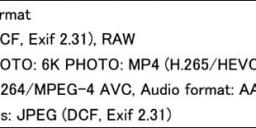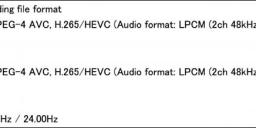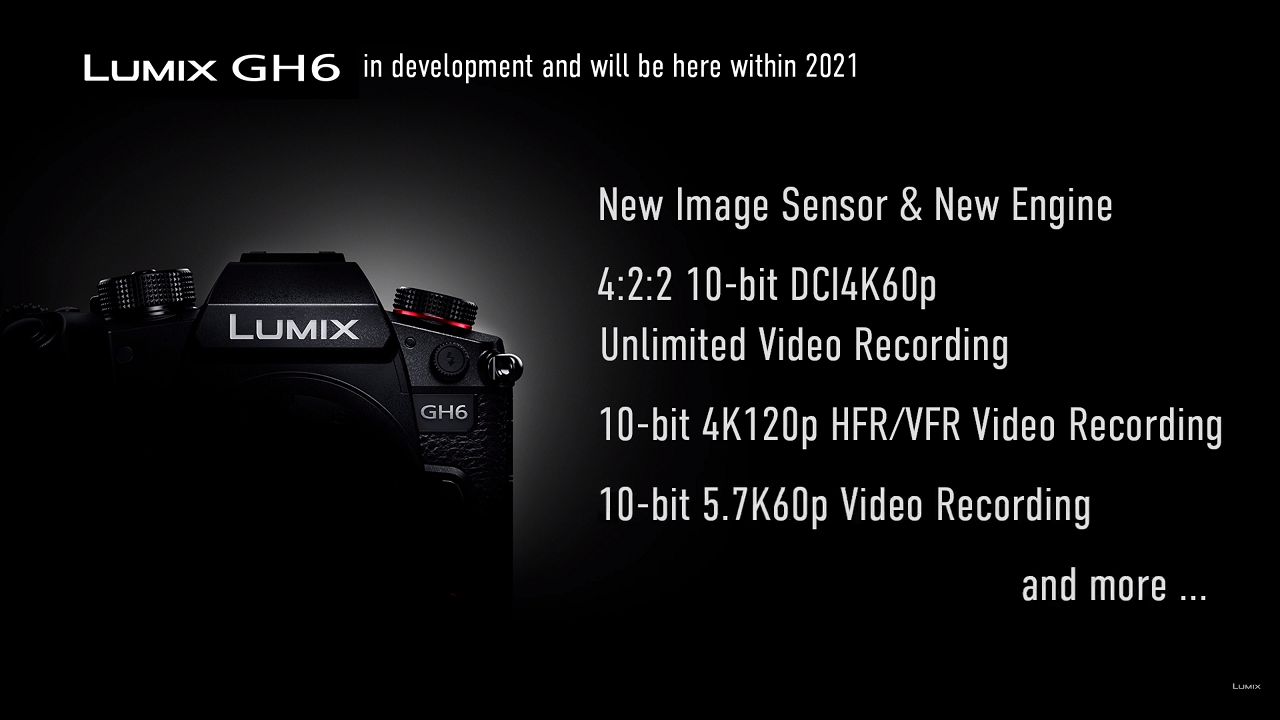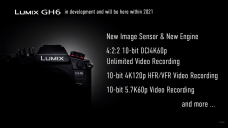
-
M4/3 will never be killed since its all ready a mature product with more than 10’years alive and millions of lenses and cameras. The format is already adopted by a wide range of manufacturers of lenses and sensors. I don’t see m4/3 dead by any means if gh6 is last native m4/3 camera. The format will continue its development as a format. I can see the discomforting feeling that no more support from panafriend to m4/3 could make some one feel but the format is long from dead. It has its advantages over super 35
-
Panasonic will announce the new GH5 II very soon:
- 20.33 million effective pixels
- 4K60p video
- 3.68 million dots 120fps compatible EVF
- DMW-BLK22 battery
- 138.5x 98.1×87.4mm
- 647g (main unit only)
- US price $ 1697 ($ 2297 for the 12-60mm kit).
Will be minor upgrade to the GH5 that will use existing L mount cameras LSI or even old GH5 LSI.
-
@endotoxic My only experience with m43 was from owning a GF2 and then a G85 several years ago. Once I moved to a larger sensor, I realized how noisy the G85 was in anything other than perfect outdoor lightning conditions. The low bitrate didn't help either. Having said that, what are some of the advantages of m43 over s35?
From my own testing, I know that for some reason the quality out of the FS7 mkII (s35) is much higher than from an A7III (full frame) in video. I can only assume it has to do with a lot of pre-processing going on with the FS7 thanks to efficient cooling.
-
If you want 8K - forget about m43, at least its Panasonic side.
-

 sa17234.jpg800 x 155 - 26K
sa17234.jpg800 x 155 - 26K
 sa17235.jpg800 x 218 - 27K
sa17235.jpg800 x 218 - 27K
 sa17236.jpg800 x 775 - 141K
sa17236.jpg800 x 775 - 141K -
Can it be worse than even previously thought?
-
Is "anamorphic 6K" the equivalent to the old DVCPro HD format? where widescreen was achieved by squeezing 1920x1080 in a 1440x1080 4x3 recording and flagging the footage with a 16:9AR? Creating pixels out of thin air
-
Is this it?
Those specs look like GH5.
No 240fps in 1080p no 120fps 4K this is the same lsi from gh5. Maybe better lithography for more hertz, but nothing new new. 6k photo my ass, we need more DR, better bitrate. 12 bit raw output, wifi output monitoring to multiple cameras , nfc with qr code for proper management of settings as sigma fpL, basically this is a gh5 2.0 with no real improvements.
Well they are killing the line, no surprise here.
-
That’s cos you didn’t use iso 400 at max. Maybe 500 maximum. No 4/3 sensor work right at more than 800. Only gh5s.
For me is like using film, very little margin to error and if not we’ll illuminated use composition and high contras light. Creativity my friend.
For every situation m4/3 it’s not perfect, but as a tool for vídeo is better than for photo.
M4/3 It’s the size of your retina, so... some similarity is given when using this size.
-
@endotoxic You are correct. I forgot that when I first got the G85, I knew very little about the iso-shutter-aperture relationship, and about staying within the limits of a given ISO and adding light where needed. Instead I was cranking the ISO just because it was available.
I always thought Olympus m43 sensors were top quality from viewing samples. Do you believe the 500 ISO max for a usable image applies as well? I actually do like grain, just not too much. I've been meaning to do a few tests and add just enough grain in camera and stay with the ISO/shutter combinations for consistency adding/removing light or opening/closing shutter for proper exposure.
-
@theusualeditor There is a trick I use for 24p.
Usually everyone uses shutter 50 or 60 for 24p. I use shutter 40. It gives a smooth but little ghosting effect at the movement and also gives a better cadence in all movement. Also that helps to mitigate the grain structure of its at higher iso. But if used at proper level and iso you get a very cinematic image with all its characteristics of movement. Just don’t pan so quickly. And give time to each subject to appreciate its own Time. It’s a trick try it and you’ll see Less video and more texture. Don do it on 60p or 120p. Only in 24p
SHUTTER 40 look at cadence. Using gh2 iso 640
It’s get rid of that extra sharpness
-
I think they are right.
8K on m43 sensor is not super useful.
8K now is used 80% for reframing and 20% for SFX.
-
Finally 4K 10bit 4:2:2 now i see why they didn't put it no GH5 II. The engine should be overclocked S series engine.
I guess price would be around $2500-$2800.
5.7k 60p 10bit 4:2:0,
4k 60p 10bit 4:2:2,
4k 120p 10 bit 4:2:0
at less than $3000 and with all GH series gimmicks. GH6 doesn't sound revolutionary, but is a healthy upgrade as a flagship camera for m4/3 system, i think this should be proof that 4/3 format is not dead yet,but its close.
This theoretically competes with A7SIII format wise. But A7SIII is a $3900 camera with better IQ overall. GH6 could potentially have many buyers jump again on m4/3 wagon, specially those who where waiting for GH6, since already many jumped to the A7SIII and spend good old pannafriend money on competition.
Size has always been 4/3 system main advantage, but full frame has shrink in body size so much that 4/3 system has no longer a size advantage, but for some reason GH series has a lot of Flexibility. Its menus, variety of formats and video options that simply doesn't exist on any other manufacturer. This with any lens, anytime reality plays mayor role on real life final choice.
Lets wait and see.
GH6S someone?
-
PR
Panasonic is proud to announce the development of the LUMIX GH6 that combines the new Micro Four Thirds sensor and a new image processor. This flagship camera of the LUMIX G Series will be commercialized for its release to world markets by the end of 2021.
After establishing the LUMIX brand in 2001, Panasonic introduced the world’s first digital single lens mirrorless camera in 2008[*1]. Since then, it has produced a host of innovative cameras and interchangeable lenses by taking advantage of the outstanding mobility and high video performance which are unique to the mirrorless camera system. These cameras and lenses were originally used for photography but have also been used for film creation. After 20 years of innovative contributions to the imaging culture, LUMIX cameras and lenses have earned a solid reputation with a wide range of users, including professional photographers and film creators.
As the next milestone in the evolution of the legacy of LUMIX cameras, Panasonic is proud to announce that the development of the LUMIX GH6 is underway. The flagship of the LUMIX G Series and the latest model of the GH line, it is renowned for its stunning mobility and innovative video performance. Combining the high-speed sensor and Venus Engine image processor, the new GH6 realizes next-generation video expression. Providing 4:2:2 10-bit DCI 4K/60p recording capability[2], the LUMIX GH6 achieves unlimited video recording when the camera is used under the certified operating temperature[3]. It is reliable enough to record continuous footage for a desired duration. It also provides a 10-bit 4K 120p High Frame Rate (HFR) and Variable Frame Rate (VFR) for high resolution slow/quick motion video. Moreover, the GH6 records 10-bit 5.7K 60p video by taking full advantage of the newly developed Micro Four Thirds sensor. Accommodating a variety of recording modes and shooting assist functions, the GH6 enables photo/video hybrid-use for various purposes including films, music videos, documentaries and short clips for social media to meet the creators’ needs. The GH6 will retail for approximately $2500.
In addition to the camera, the new interchangeable lens will be added to expand the G Series lineup, and the LEICA DG 25-50mm F1.7 is also under development. It covers from 10mm to 50mm (35mm camera equivalent:20-100mm) together with the LEICA DG VARIO-SUMMILUX 10-25mm / F1.7 ASPH. (H-X1025) which is currently available and has been met with high acclaim. These two lenses have common aperture, high descriptive performance, shape and operability so that it is easy to make the creator’s own unique image product using these two lenses with minimal workflow.
While the LUMIX G Series based on the Micro Four Thirds standard boasts high mobility, the LUMIX S Series offers high descriptive performance made possible with the full-frame sensor. With these two series, Panasonic demonstrates its commitment to further providing maximum product value as a tool for users to unleash their creativity and challenge the ever-changing photo/video culture in the digital era.
-
Some rumors
Some Japanese sources tell that GH6 design and chipset had been ready for at least 20 months.
Yet, Panasonic had at least 3 different GH6 prototypes. After COVID two most advanced and expensive prototypes had been abandoned, as they required more funds.
One prototype had been rumored to use special version of Dual Pixel like sensor.
Howdy, Stranger!
It looks like you're new here. If you want to get involved, click one of these buttons!
Categories
- Topics List23,992
- Blog5,725
- General and News1,354
- Hacks and Patches1,153
- ↳ Top Settings33
- ↳ Beginners256
- ↳ Archives402
- ↳ Hacks News and Development56
- Cameras2,367
- ↳ Panasonic995
- ↳ Canon118
- ↳ Sony156
- ↳ Nikon96
- ↳ Pentax and Samsung70
- ↳ Olympus and Fujifilm101
- ↳ Compacts and Camcorders300
- ↳ Smartphones for video97
- ↳ Pro Video Cameras191
- ↳ BlackMagic and other raw cameras116
- Skill1,960
- ↳ Business and distribution66
- ↳ Preparation, scripts and legal38
- ↳ Art149
- ↳ Import, Convert, Exporting291
- ↳ Editors191
- ↳ Effects and stunts115
- ↳ Color grading197
- ↳ Sound and Music280
- ↳ Lighting96
- ↳ Software and storage tips266
- Gear5,420
- ↳ Filters, Adapters, Matte boxes344
- ↳ Lenses1,582
- ↳ Follow focus and gears93
- ↳ Sound499
- ↳ Lighting gear314
- ↳ Camera movement230
- ↳ Gimbals and copters302
- ↳ Rigs and related stuff273
- ↳ Power solutions83
- ↳ Monitors and viewfinders340
- ↳ Tripods and fluid heads139
- ↳ Storage286
- ↳ Computers and studio gear560
- ↳ VR and 3D248
- Showcase1,859
- Marketplace2,834
- Offtopic1,320















